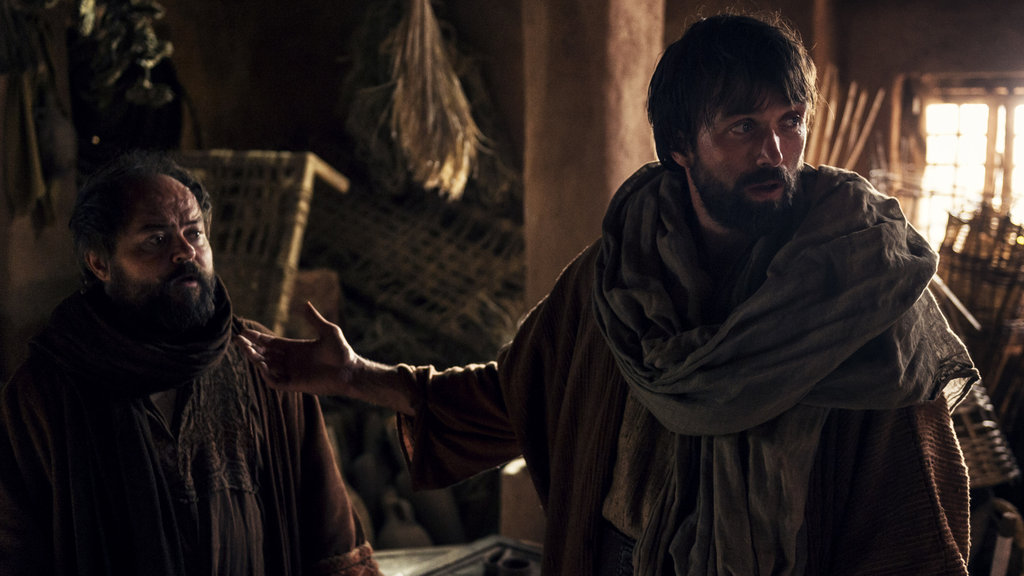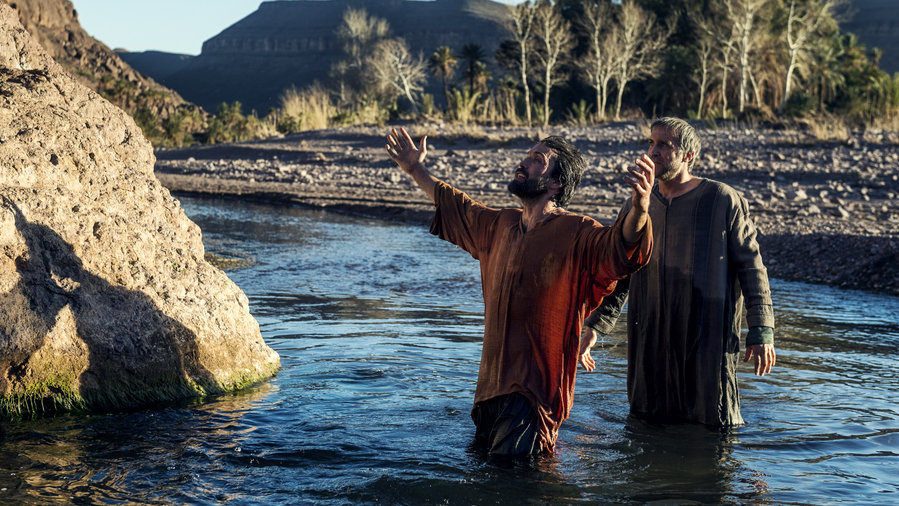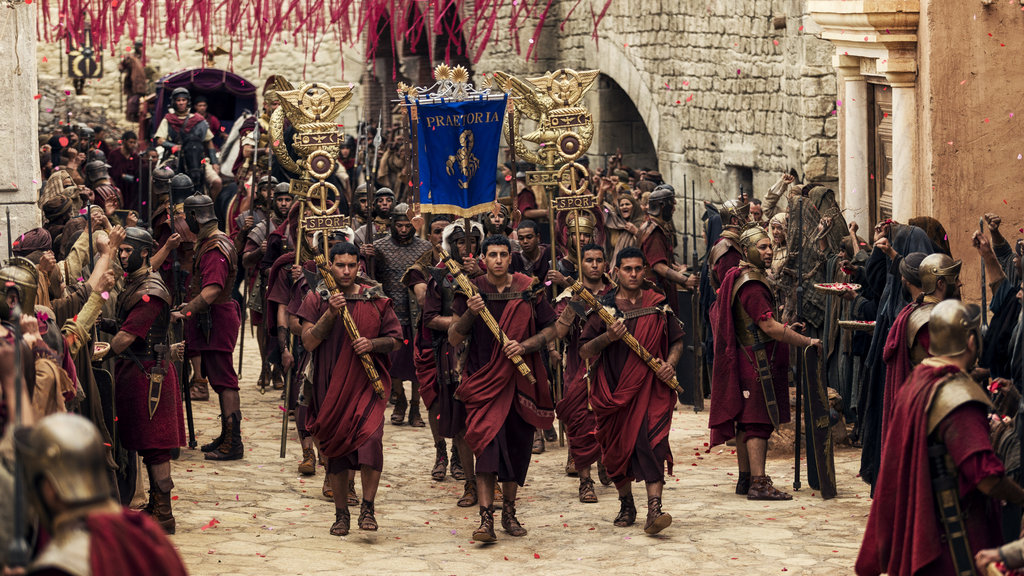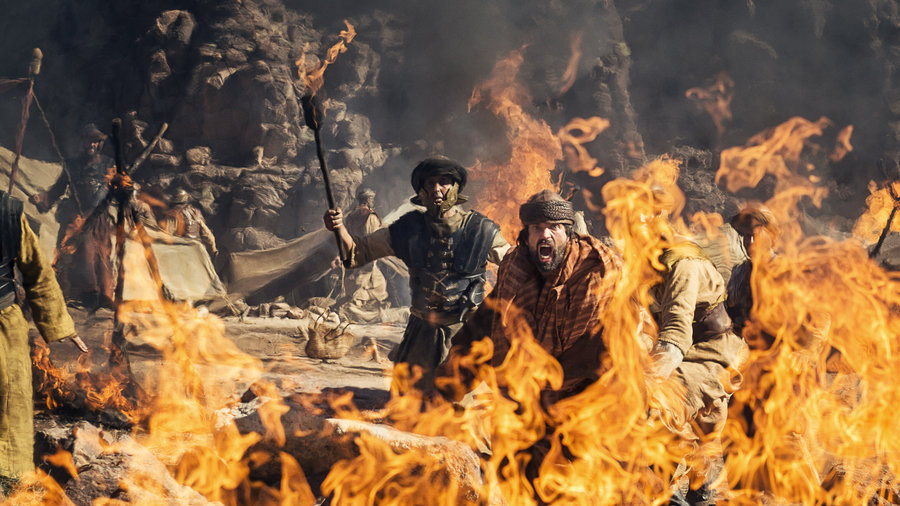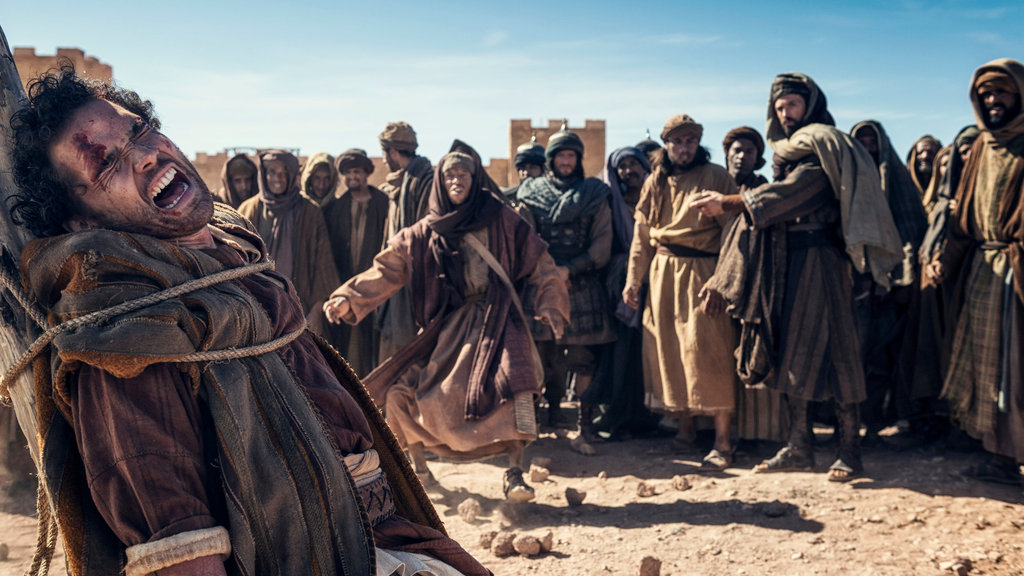
Observations
Here’s what I’ve really learned from the series: Caiaphas loves to take baths. (He has been portrayed more than a few times enjoying his baths and scolding people for interrupting him.)
I’m quite perplexed with this episode and not entirely sure what to make of it. It covers the portion of Acts from 5:12-8:1a. But what is found in this program can at best be said to be “inspired by some of the accounts found in the texts.” There is very little in congruence between the program and the text of Acts.
I think there were two martyrs in this program. The obvious one is Stephen, but perhaps Boaz was the real “first” martyr. The community of Zealots would certainly see him as one, but was he converted to the way of Jesus that compelled him to surrender and accept his fate? If so, then at least as far as this program is concerned, Boaz may have been the first “Christian” martyr. It is an interesting addition that the producers have made.
It is an entertaining and engaging episode, but due to its vast departure from the text of Acts and its predominant focus on the (non-scriptural) religio-political conflicts, I give this episode a rating of 5 out of 10.
What Did It Get Right?
The reason for Ananias and Sapphira’s deaths (previous episode) are finally given as “lying to the Holy Spirit” at the beginning of this one.
The arrest and the miraculous release of the apostles, their subsequent preaching in the Temple, their second arrest, Gamaliel’s counsel, and their flogging. (Acts 5:17-41)
Stephen asking forgiveness for his killers. (Acts 7:59-60)
That’s pretty much it for this episode.
Problems
The many problems with what is in this series and episode vs. what is found in Acts… Where shall I begin? (I choose to completely ignore the narrative sequence differences.)
The whole “Camp Christian” thing is fiction, and not even a good one at that. As I note in the first paragraph under Synopsis, it seemed like in the early episodes both the Jewish authorities and the Romans wanted to get rid of anyone claiming to be a follower of Jesus. But somehow the apostles get to set up camp within what appears to be a short walking distance away from Jerusalem, they will take in anyone, and the authorities don’t seem to care or suspect anything. They didn’t have modern surveillance but surely their intelligence wouldn’t have failed them this badly.
The text of Acts really cannot be read any other way than to read it as having the apostles and all the believers in Jerusalem, daily worshiping at the Temple.
Second, the whole appointing of “deacons” veers far from the text of Acts. There is apparently no internal conflict within the Christian community. Rather it is merely that the camp is getting so large that Peter needs more help in managing it. So he asks Stephen and Philip to manage the camp. But Stephen protests. He is far too educated and knowledgeable to be a camp manager. The biblical text state no such thing. (Tradition was that deacons were there to “serve tables” but some of the more recent scholarship suggests that the most proper understanding was that they were to manage the distribution of the common funds and property.) Also, where were the other five? Stephen is important because he’s needed to die at the end of this episode. And Philip probably returns in a near episode.
In the text of Acts it is said of Stephen: “Stephen, who stood out among the believers for the way God’s grace was at work in his life and for his exceptional endowment with divine power, was doing great wonders and signs among the people.” (Acts 6:8 CEB) But in this program Stephen is portrayed as rebellious and impetuous, something almost diametrically opposed to the biblical text. The reason for his martyrdom in Acts is that he is falsely accused and brought before the Sanhedrin. In the program he impetuously goes to the Sanhedrin to accuse them of their errors.
I understand why an action TV program cannot have its entire time taken up by a sermon, but the most important sermon in Acts is shortened to just a few sentences. At least what was kept was a fairly decent paraphrase (Acts 7:51-53) of what finally made the authorities turn against Stephen.
Completely absent from the program is Stephen proclaiming his vision of Jesus in heaven, sitting next to God.
The real travesty of this episode is that it covers a huge amount of biblical ground, but the actual time spent by the program dramatizing the biblical text is a very small portion. A far greater portion is found dramatizing the (non-scripturally based) conflicts involving Pilate, Caiaphas, and the search, surrender, and death of Boaz.
Even as a somewhat liberal, and very progressive Christian, I find the definition of the gospel that is implied and communicated in this series to be rather bland, flat, and uninspiring. I appreciate the theme of non-violence and non-judgment, yet I haven't really seen anything so far that is truly worth following or dying for in what the Jesus followers have shown. Perhaps the problem lies somewhere in two things Peter says in this episode. 1) Christianity is all about love for all people and forgiveness. 2) But he cannot defend it because it’s something he “just knows.” It cannot be clarified or explained. As much as it pains me, a progressive Christian, I have to say that the kind of non-violence, non-judgment, and love that is being preached in this series, I would be hard pressed to find it worth dying for, let alone live for.
Motifs
Politics. This episode was pretty much about the conflict between the Romans and the Jews. It does get resolved, to a degree, with the surrender and death of Boaz. But new tension opens up between Claudia and Leah when Leah has the guts to accuse Claudia of being part of “the problem.”
Conscience and compassion. Pilate is turning into a genuine jerk. He cares for no one (including himself). His only care is to do what he thinks Rome wants. On the other hand, Cornelius continues to follow orders and perform actions that he believes are loyal to Rome, but his conscience is having trouble reconciling his actions with what is right.
Non-violence, non-judgment, forgiveness and love. Peter and the apostles will accept whatever is done to them as God’s will. Whether they suffer death or their camp is destroyed, if it happens, it must be God’s will. He won’t turn in Boaz, even to save the camp! On the other hand, I find this unquestioning acceptance rather unbelievable and problematic. And what does it say about God?
Synopsis
Begins at the Christian “Camp” (the land donated by Barnabas in previous episode). People are afraid of Peter because of Ananias and Sapphira. (So this really begs the question: why don’t the Jewish and Roman authorities come here to just round them all up and shut it down? Isn’t that what they want?) Mother Mary comforts Peter and tells him that Jesus came to free people from hopelessness and despair, the very thing that is confronting the Jews of Jerusalem daily with the Roman noose (or spike and hammer) literally around them.
Jerusalem. Cornelius comes to Pilate and reports that Boaz has not yet been found. Pilate is not happy. He notes that there will be a wedding taking place this day and orders Cornelius to take ten women to serve “justice” by crucifying them. Claudia looks askance; Cornelius hesitates a moment but leaves to carry out the order. Claudia asks Pilate if he has any compassion. He has none. He does only what he would do to insubordinate soldiers under his command.
Caiaphas is floating on his back in his bath… (Uh, what…?)
Peter explains that Ananias and Sapphria’s deaths were punishments from God for lying to the Holy Spirit. The fear is paralyzing the Christians. Peter is asked what they should do. Peter tells them that the camp can offer Jews freedom from fear, that they could share what they have with any who come. To do any less would be to be the same as Ananias and Sapphira. The apostles make a return to Jerusalem. Back at the camp, Maya (Peter’s daughter) is introduced to Tamar, a young girl who has lost everything.
Back to Caiaphas in the bath. Leah comes to tell him that the assassin’s name is Boaz. Boaz’s fiancée has been found. She could lead them to Boaz. Cut back to camp. Boaz is there. Leah approaches Eva (Boaz’s fiancée) to ask her to give up Boaz, for the sake of Jerusalem and her people. Eva refuses.
Peter and company return to the house they had occupied earlier. When they enter there is a group within. The leader is Philip. They need help. Some do not share belief in Jesus. Philip had been baptized by James. They will be taken to the camp.
Cornelius enters the location of the Jewish wedding, but no one is there. He returns and accuses Claudia of tipping them off. He states that Roman soldiers cannot afford to think and have a conscience. They simply carry out orders, or else Rome will fall. Claudia declares how convenient that he can use this as an excuse to absolve himself of any responsibility. He reveals that the ten were taken from the marketplace. He asks, were they any deserving of death than those at the wedding?
Caiaphas hears the horns sounding the crucifixions. Leah tells him that Eva was holding something back.
(That was a very packed first segment.)
Back at the camp, Peter asks Stephen and Philip to look after the camp. Stephen objects – he is educated and well-versed in scripture and languages. Looking after the camp is not in his job description. He believes he was meant to preach. Stephen starts to move off but Peter thinks of something that will put Stephen’s skills to good use.
Eva comes to see Leah. The only thing she knows is that Boaz went some place where his sins could be forgiven. Caiaphas is listening behind a screen. Eva is led to a room where she will be kept until Caiaphas returns with Boaz. Caiaphas rides out to the Christian camp where he speaks with Peter. (Peter has Stephen translating scripture.) Caiaphas asks for Boaz. Peter does not know (or chooses to not know) if Boaz is in the camp. Peter goes to see Boaz. Peter won’t give up Boaz because only God can decide a man’s fate. The foundation of this community is love for all people. All Peter can do is to forgive Boaz, even if it means Romans come to destroy the camp. If that happens then it is God’s will and so be it. Boaz sits to think.
Boaz returns to Jerusalem and gives himself up to Caiaphas.
(End segment 2)
Caiaphas wonders why Boaz would give himself up. Leah comes to Eva to tell her that Boaz surrendered.
Maya and Mary Magdalene converse. They talk about Tamar.
Claudia and Leah talk. Boaz has been found so things can return to “normal.” Leah questions what this “normal” is. For Claudia it is the return to a balance of powers. Leah asks if this is how things should be. Leah accuses Rome of tyranny, of draining resources from Judea, and committing mass murder. Leah wants to know if “normal” means returning to being the “grateful subject”of Rome. Leah tells Claudia she cannot understand because she is Rome. Leah accuses Claudia of being the problem. Claudia slaps Leah. Claudia’s action has proven Leah’s accusation.
Boaz is brought to Pilate. Pilate orders Boaz to show, on him, where Marcus was struck. Boaz slowly approaches, shows the slit to the throat. Pilate takes a small dagger and stabs Boaz. Boaz will die very slowly over many days. Pilate twists the dagger into Boaz. Bleeding, he is taken away. Boaz is tortured in public. A man (Levi) with an arrow takes the life of Boaz to end the torture.
(End segment 3)
Pilate is upset that Boaz was killed. He is angry with Cornelius for allowing this to happen. Pilate accuses Cornelius of sympathizing with the Jews.
Caiaphas and Peter encounter one another at the body of Boaz. Peter begins to sing a psalm; Caiaphas joins in. Peter preaches forgiveness and love for all. He continues to speak of Jesus and the establishment of a new kingdom. Caiaphas orders Peter taken. Stephen is allowed to go tell the others and the guards will be waiting. The apostles return to Jerusalem. The temple guards are waiting and arrest all of them. John thinks something bad is about to happen. Peter believes something wonderful will happen.
Eva speaks with the leader of the Zealots (Levi, the one who shot Boaz). She knows Boaz must be replaced and offers to take his place. She wants to be taught how to kill.
It is during the night, in the temple prison. Locks are miraculously broken. The cell doors are opened. An angel stands in the doorway leading out.
(End segment 4)
The apostles appear in the temple courtyard where they preach about turning away from hate and violence. They preach the message of Jesus, which is hope and love for all peoples. Jesus is the resurrection and the life. Temple guards arrive and take the apostles away, once more. They are brought before the gathered Sanhedrin. Caiaphas asks how they escaped. The apostles remain silent. They are accused of preaching under the name of a false prophet and of conspiring to to lead souls astray. Caiaphas demands an answer.
Peter finally responds. They cannot defend what they believe; they simply know it is true. Truth cannot be defended or clarified – it simply is. “What is the truth” asks Caiaphas. Peter responds, “That God raised Jesus from the dead, to sit at his right hand as Prince and Savior. And it was his Spirit that freed us from your chains.” They have condemned themselves. Caiaphas orders them to be stoned to death. Gamaliel steps up to interrupt Caiaphas and the proceedings. He counsels that the apostles be left alone. If there is nothing to what they say, the movement will fade away in time. But if there is something to the movement, Gamaliel warns that by trying to destroy them, they will be in opposition to God. The Sanhedrin is in uproar. Caiaphas raises his hands to calm them. Stoning will be commuted, but they will be publicly flogged.
Flogging of the apostles as Caiaphas recites from scripture about law, obedience, and judgment.
(End segment 5)
Back at camp Peter’s wounds are washed by Maya. Stephen looks on but he cannot accept this kind of treatment. Maya asks if they should go home to Galilee. She wants to go home. The camp doesn’t need Peter’s presence to continue running. But Maya knows Peter won’t leave. Maya is leaving to return home to Galilee. She will take Tamar with her, to Galilee, where they can be safe.
Stephen returns to Jerusalem. He goes to the temple. The Sanhedrin is meeting. Stephen interrupts the council and accuses them of being like their rebellious ancestors. Stephen is taken away, dragged outside of the city and stoned. Saul looks on. Stephen: “Lord Jesus, receive my spirit. Do not hold this sin against them.” Saul hands another a final stone to finish off Stephen. He goes to make sure Stephen is dead.
(End of episode)
